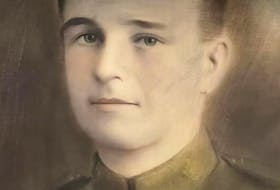Sister Dorothy Moore often makes her prayers in Mi’kmaw, an act she sees as a gift to her community and a testament to her father’s strong determination to never let his daughter forget her language.
A respected Mi’kmaw Elder, educational leader and a Sister of St. Martha, Sister Dorothy Moore has spent her life advocating for the rights of the Mi’kmaq and preserving the Mi’kmaw language.
“You are identifying yourself, through your language, as a Mi’kmaw,” Sister Dorothy said in a recent interview from her home at Parkland Antigonish.
“If (you’re) speaking Mi’kmaw you are totally Mi’kmaq in tradition, in culture, in spirituality.”

But when Sister Dorothy sees statistics on the declining number of people speaking the language, she deeply understands why. Born in 1933 and raised in the Membertou Mi’kmaw community, she attended Indian Day School and the Shubenacadie Indian Residential School. At the school, they forced her to speak English and punished and humiliated her for being a 10-year-old Mi’kmaw child.
“When I went to Shubenacadie School and I learned how to speak, in some way, a book in English, I was so proud. It was instilled into me that to speak English meant that you were a great person, that you were accepted,” she said. “When I arrived home, good heavens. My father hearing me speak English in our house when he always said: ‘When you’re under my roof, you speak the language.’” He threatened punishment if she didn’t go back to speaking her language.
Sister Dorothy is grateful for her father’s strength and conviction. His legacy pushed her as a teacher, a principal, native education coordinator at Cape Breton University, and director of Mi’kmaq Services for the Nova Scotia Department of Education and Early Childhood Development to break down systemic barriers, leading the Mi’kmaq to have better access to all levels of education. She also worked for decades to reclaim and promote Indigenous ways of learning and living.
A new book, A Journey of Love and Hope: The Inspirational Words of a Mi’kmaw Elder (Nimbus Publishing), brings together Sister Dorothy’s speeches, presentations, and ceremonies to universities, governmental departments, and Indigenous organizations and gatherings. The book’s thematic sections include culture and language, spirituality, racism, education, prayers and ceremonies, as well as introductions by Mi’kmaw writers and educators, and the congregation leader of the Sisters of St Martha.
By telling her story, Sister Dorothy hopes to help heal wounds endured in the past and to gently encourage them to continue to move forward. Now retired, she remains optimistic about the future.
She still passionately believes the words she spoke publicly in 2015: “Let’s stop blaming Residential Schools, government, and parents, etc. Let’s instead reclaim who we truly are as our Creator meant us to be.” She wants her words to inspire people to take pride in their Mi’kmaw language.
She takes heart from the people she meets who are taking evening classes or reading books trying to learn their beautiful but difficult language.
“If you are learning to speak a few words, you are moving forward,” she said.
Sister Dorothy is especially excited for children in places like the Eskasoni community who are attending Mi’kmaw immersion school and are fluent in the language by Grade 6. But looking ahead, she knows there remains work to do.
By 2027, children aged four and younger will not be able to speak the language if current trends continue; the number of children under age four learning Mi’kmaw decreased to just 20 per cent in 2013 from 44 per cent in 1999, according to Nova Scotia’s L’nu Affairs.
Last April, legislation was introduced recognizing Mi’kmaw as Nova Scotia’s first language. The act is intended to support efforts to preserve the language for future generations.
“Sister Dorothy has raised and improved the Mi’kmaw consciousness through post-secondary education and tackled systemic racism in the education system,” said Marie Battiste, special advisor to the vice-president academic and to Unama’ki College on decolonizing the academy at Cape Breton University, in the book’s introductory remarks.
“Gracefully, she has become a trusted friend and respected Elder in Nova Scotia and in Mi’kmaw life, helping to build the Indigenous renaissance, never as an aspiring leader but as a gentle warrior activist of the (poet) Rita Joe tradition.”
Join Sister Dorothy at the Membertou Trade and Convention Centre on Oct. 13 from 1 p.m. to 3 p.m. for the launch of A Journey of Love and Hope.

Writing With My Eyes
Unable to write with her hands, Angela Parker-Brown wrote every word of her memoir, Writing With My Eyes: Staying Alive While Dying (Pottersfield Press) with the help of eye gaze technology.
Parker-Brown has ALS or amyotrophic lateral sclerosis, a progressive nervous system disease that affects nerve cells in the brain and spinal cord, causing a loss of muscle control.
She was a 46-year-old single mom, raising her eight-year-old twin daughters when she started developing painful symptoms in her right foot that got worse and spread. In 2018, she was diagnosed with ALS.
Born in Digby, and now living in Truro, Parker-Brown wrote her story to inspire others to find ways to thrive no matter what their lives look like.
“I tell my intelligent, fun and beautiful Pair Bear and Parkie (her daughters, Paris and Parker), do not wait for the negative to celebrate the positive. I tell you the same. Let yourself shine, Full Capacity Sparkle,” Parker-Brown writes to her readers.

Cold Edge of Heaven
Pictou County-native Whit Fraser was inspired to write his novel Cold Edge of Heaven (Boulder Books) after visiting the abandoned RCMP station on Devon Island in Nunavut and finding three graves surrounded by a white picket fence nearby.
Set in 1924, the novel is a story of murder, mystery, and love—intensified by a clash of cultures between RCMP officers and the Inuit guides who live and work alongside them.
Fraser has spent years living in Canada’s North. He is married to Mary May Simon, Canada’s first Indigenous governor-general. He was with the CBC for 25 years, including working as a journalist with CBC North and as a national parliamentary reporter in Ottawa. Following his journalistic career, he was the founding chair of the Canadian Polar Commission, and former executive director of Inuit Tapiriit Kanatami, the national Inuit organization.
Postcard Story Contest
The Writers’ Federation of Nova Scotia is calling on writers to submit pieces of micro-prose - fiction or nonfiction of 250 words or less — for its third annual Postcard Story Contest.
Entries may be on any theme but must be original, unpublished work in English by permanent residents of Nova Scotia. The deadline is Oct. 27 and the winner receives $250, along with a digital publication of their winning work.









